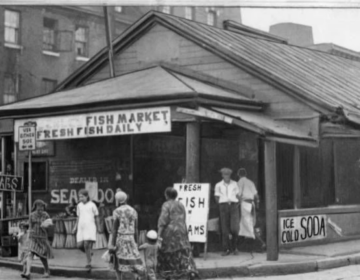As U.S. remembers MLK, West Philly museum considers the legacy of Malcolm X
As the country remembers MLK on the fiftieth anniversary of his assassination, the legacies of the two men are almost inseparable.
-
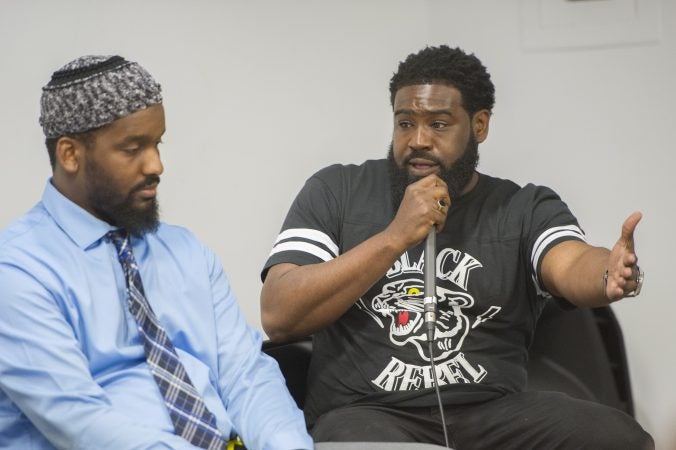
B. F. Nkrumah, (right), shares his views on Malcolm X with Mujahiddeen Mohammed and audience members. (Jonathan Wilson for WHYY)
-
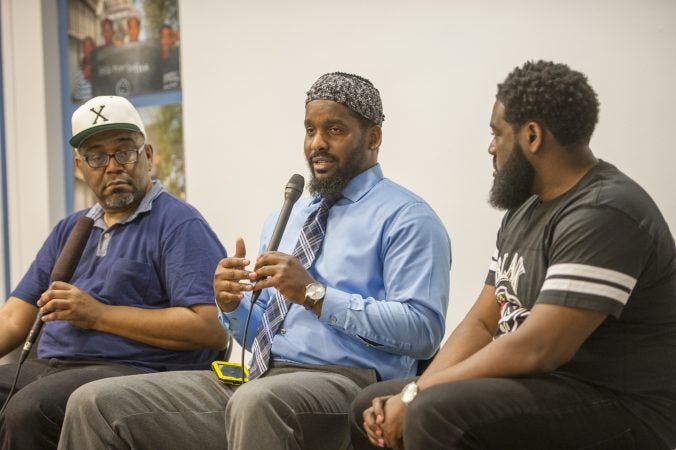
Moderator Michael Dennis, (left), Mujahideen Mohammed, and B. F. Nkrumah, (right), share their insights with the audience. (Jonathan Wilson for WHYY)
-
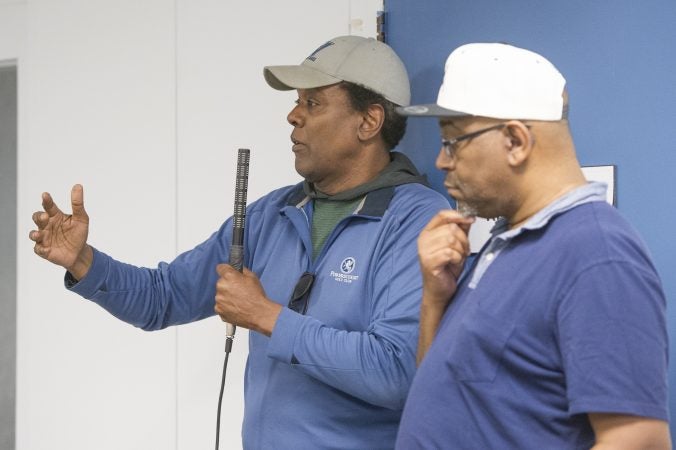
Lloyd Booker shares his views with speakers and audience members. Moderator Michael Dennis listens. (Jonathan Wilson for WHYY)
-
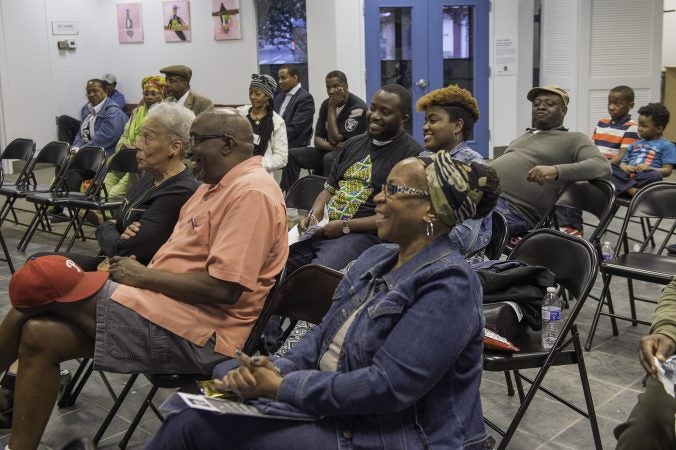
About two dozen people listen to community leaders discuss the legacy of Malcolm X. (Jonathan Wilson for WHYY)
-
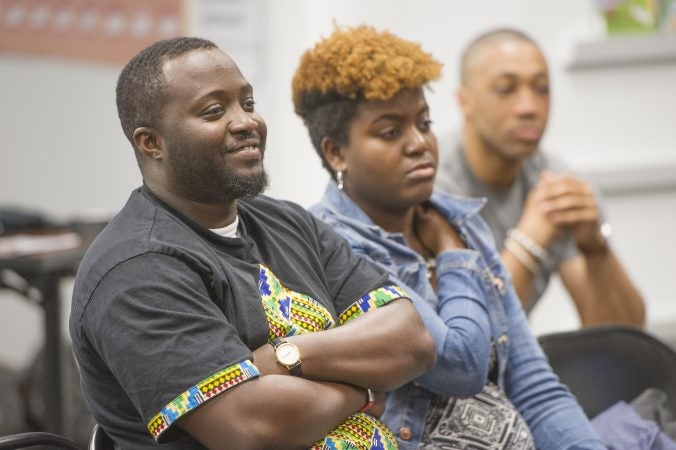
Audience members listen to speakers discuss the legacy of Malcolm X. (Jonathan Wilson for WHYY)
-
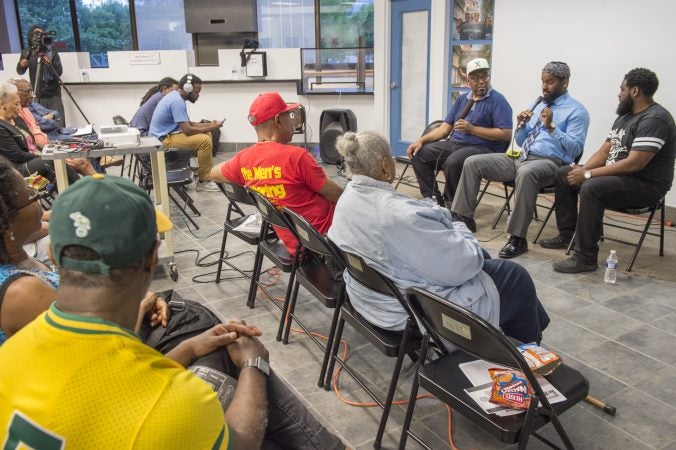
About two dozen people listen to community leaders discuss the legacy of Malcolm X. Speakers (from left) are moderator Michael Dennis, Mujahideen Mohammed, and B. F. Nkrumah. (Jonathan Wilson for WHYY)
-
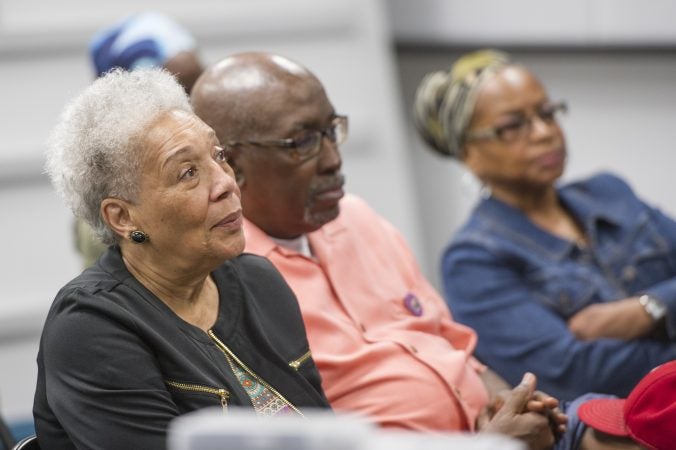
Audience members listen to speakers at event about Malcolm X. (Jonathan Wilson for WHYY)
-
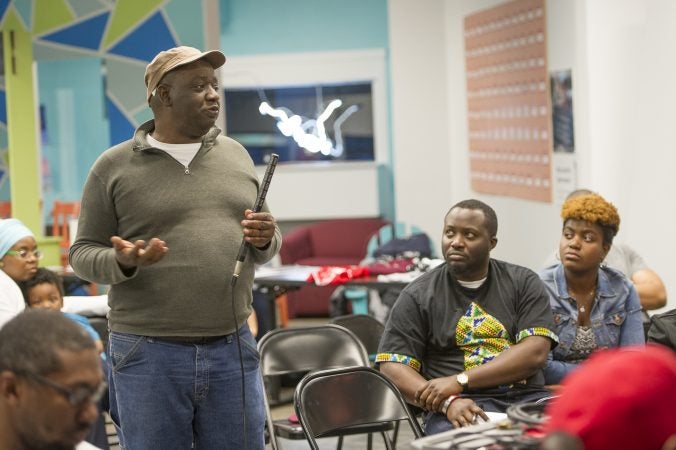
Abdul Salau shares his views with audience members and speakers. (Jonathan Wilson for WHYY)
Abdul Rahim Muhammad, director of the museum at the New Africa Center in West Philadelphia, is on a mission is to preserve the history of African-American Muslims in the area through the inevitable changes that come with gentrification.
His latest endeavor is 10-day series of events held at venues throughout the city, honoring the legacy of Malcolm X. The series of film screenings and panel discussions began on May 10 and will run through May 19, what would’ve been Malcolm X’s 93rd birthday.
While many learn about the civil rights leader in history books or pop culture references, Muhammad’s connection to Malcolm X is more personal.
“Malcolm X used to come to my house, frequently,” said Muhammad, 66, “because my father used to minister with him.”
Malcolm X and his wife, Betty Shabazz, used to visit Muhammad’s parents when they traveled to Philadelphia, he said. Malcolm X was a teacher and administrator at Temple 12 on the 42nd block of Lancaster Avenue, steps away from the New Africa Center, and used to meet with Muhammad’s father to discuss spreading the word about the Nation of Islam. He said the two would sit at the dining room table and talk about “pulling the brothers up from the muck and the mire.”
“As a young boy that’s 5, 6, 7, 10 years old, you don’t really realize and recognize the significance of the people that you are in company with,” Muhammad said. “But as I got older and I became a grown man, I come to realize that we had very significant individual that was a close friend of my dad’s and a part of my community and a part of my personal experience.”
Malcolm X began as a leader in the Nation of Islam and rose to prominence during the late 1950s and early 60s, as the country was in the throes of the civil rights era.
At the time, Martin Luther King, Jr., with his peaceful resistance and civil disobedience protests, was the face of the movement, which pushed for racial integration. But Malcolm X — who was under the influence of Nation of Islam leader Elijah Muhammad at the time — was opposed to integration. He introduced the concept of Black Nationalism, an ideology that preached to black people self-love, self-determination, self-defense, and complete autonomy from white society.
In his book, “The Autobiography of Malcolm X,” he criticized the idea of free association between races.
“A thousand ways every day the white man is telling you, ‘You can’t live here, you can’t enter here, you can’t eat here, drink here, walk here, you can’t ride here, you can’t play here, you can’t study here,’ ” he wrote. “Haven’t we yet seen enough to see that he has no plan to unite with you?”
While many blacks could relate to this sentiment, his ideology was tainted by generalizing all white people as evil, a tenet in the teachings of Elijah Muhammad. Later in his life, after leaving the Nation of Islam, Malcolm X changed his perspective and welcomed whites as allies in his fight for equality.
Fifty-three years after his death, his message still resonates. And as the country remembers King 50 years after his assassination, the legacies of the two men are almost inseparable, though they only met once at a Senate debate over the Civil Rights Act of 1964.
The alliteration of “Martin and Malcolm” can be heard throughout popular culture, even in comic books, with Martin viewed as the peaceful resistor and Malcolm as the radical revolutionary.
Ismael Jimenez, an African-American history teacher at Kensington Creative and Performing Arts High School, doesn’t trust this dichotomy. He said King is often portrayed as someone less detrimental to societal norms, fighting against blatant and brutal racism in the South. Malcolm X on the other hand was seen as more disruptive, exposing the day-to-day, subtle systemic racism in urban ghettos.
“Martin was shown as someone who was much more able to be dealt with,” said Jimenez. “But Malcolm in the urban North complicated that narrative of what fighting for civil rights actually meant.”
Today, some in the black community, like local author and speaker Bamidele Nkrumah, wonder how effective the civil rights movement really was.
“I am not an advocate of the civil rights era,” said Nkrumah, who also goes by the name Mitchell Chance. “Matter of fact, I hate it. Malcolm’s philosophies on nationalism, that’s what I lean towards today.”
More than five decades after the passing of the Civil Rights and Voting Rights acts, which ended Jim Crow, racial discrimination continues to cripple black success, giving credence to Malcolm X’s criticism.
Now, instead of lynchings, police shootings of unarmed black citizens occur at disproportionate rates, housing and school segregation persist. Mass incarceration has led to the imprisonment of more black men than people of any other race, though they make up a fraction of the adult U.S. population.
If black people followed the path of Black Nationalism, Nkrumah said, they’d be in a better social position.
Both Muhammad and Jimenez said the idea of choosing one leader over another causes division, and each man and their peers were crucial to overcoming racial inequality.
“The bottom line is we have to see that all of these men were working towards freedom for our people,” said Muhammad. “They may have had different methods and ideologies on how they approached it, but the ultimate goal was all the same: to raise our people up.”
WHYY is your source for fact-based, in-depth journalism and information. As a nonprofit organization, we rely on financial support from readers like you. Please give today.




